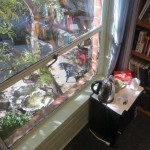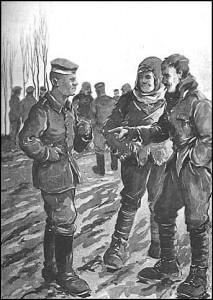Earlier this summer, I got an email from John Buchanan, a current student in the Torrey Honors Institute:
Hello, Dr. Jenson.
As you may be told from time to time, you are the mentor that seemed sensible to talk to regarding the subject of this email… Probably because you are a younger male but who knows for certain. I wrote this email in the same form as I would talk to you about something in an office hours, but as there is no more time for office hours, I am hoping an email will suffice. I wrote quite a bit at first, which was probably just for my own benefit, and have condensed it to the core. I understand if you do not have time to reply, and thank you for your time and wisdom.
Am I supposed to be learning about how experiences happen before I experience them? I feel robbed of my experiences. The knowledge I am gaining from Torrey is undoubtably invaluable, but I am young and full of energy and ideas. I do not feel qualified to talk for three hours (or write a paper) about sex, or love, or being old, or being even twenty-years old (because I am not yet), or ruling, or being ruled, or dying, or so many other themes. I do not even feel qualified to talk about friendship because I have only since beginning college started actually being in completely healthy friendships.
What is the expectation of me as a young student? Am I to bring experience of truth into discussions or learn about truth from words while in a chair? How am I supposed to know what beauty is if I am trapped inside all day?
If you have any understanding of this to pass on to me (through written words, ironically) I would appreciate them.
I cannot wait for the summer.
– John Buchanan
What a great question. To learn about something, it seems we’ve got to know about it already to some extent. This was the quandary Socrates considered in the Meno. If I don’t know something, I can’t begin to search after it; if I do know it, there’s no need to. Here, John’s asking a particular form of this question with reference to the knowledge that comes from experience. We learn best through cycles of action and reflection–but what if, as John suggests, we don’t have broad or deep enough action on which to reflect? Who knows, maybe we should just postpone college till, say, age 40. Give people some basic skills, get them out living life, then invite them back in middle age to reflect on their lives so far.
Maybe, though I suspect there’s more to it. Here’s what I wrote in response:
Hi John,
Thanks for this email from back in May. It was a hectic time, and since then I’ve mostly been in email hibernation mode. Now I’m yawning, though, and slowly waking from a long email nap. I hope this is helpful in response, though I’d imagine you’ve got plenty of new thoughts on this topic by now. One thing I smelled in your email was that combination of exhaustion and exasperation that comes at the end of the semester, and particularly the end of spring semester, when the thought of being outdoors, able to touch grass and ground, to be relatively untrammeled and simply live sure sounds a lot better than yet another book, paper or test. I feel the same about that time of year.
In one sense, you’re right. You don’t know much about sex or love or being old or king. In light of that, you might think of your education as a time to gain categories for the big features of life that you have yet to meet and to glean from the hard-won experiential knowledge of others. You may not know about growing old, but you can watch Lear lose his focus and grip on reality and succumb to decades of selfishness, taking a kingdom along with him. That does a couple things: It expands your imaginative sense of aging. We experience reality through our imaginations; we paint scenes and tell stories in our minds of what our growing older, say, will look like. But our imaginations are limited to what we’ve seen and heard, to a great extent. Others’ lives–even in fictional ones–can expand our sense of what is possible, for good or ill.
Now, that’s no substitute for living, of course. Books are meant for lots of things, certainly including fun and diversion, but the greatest of these is to aid us in living well. We don’t only read Lear for fun; we don’t even read it just to learn about aging. We read it, in significant part, so that we may live, and age, well. One big mistake Torrey students make is thinking that, because they’ve got a rich conceptual grasp of reality, they have figured out life. Far from it. Once we get the conceptual tools in place–and, of course, those tools need sharpening throughout life, and often enough replacing–we have to try them out on life itself. I can’t count the number of times I have learned in my heart and gut and with my hands what my head has long known. And that’s not a knock on head knowledge. In fact, I think the head knowledge has helped me recognize truth with my heart, gut and hands; but there’s no replacing that knowledge that I know from the inside because I have lived it. There’s also no shortcut to it. So while I wouldn’t worry about your relative lack of experiential knowledge at this point, and while I still think reading all these books does you a world of good, don’t let anyone fool you by telling you that critical mastery of Lear is as good as gaining the wisdom of aging.
One more thing, though: Don’t sell yourself short. You know far more than you know. Twentyish years is a lot of years. What’s more, those are formative years, years that will stick with you even after your twenties are a blur. You may not know about [cue sweeping orchestral music] LOVE!, but you’ve had a crush on someone. You’re known a crush unrequited. You’ve probably been on a date, squirmed with awkwardness, not been able to think about anyone else, thought your life wouldn’t go on without them, etc. Sound cliche? Well, I suppose it is; but maybe it’s better to say it’s common, in the best sense of the word. We all know something of that experience. And it doesn’t take that much work to draw an analogy from, say, the crush of a 15-year-old to, well, just about any of the relationships in Pride and Prejudice. Same goes for any number of topics. It may just be that you have yet to tap your experience as you run into what seem like more regal accounts of life in our curriculum. I’d be willing to bet a lot of money that most of the authors we read would feel far more ‘common’ in person than their sometimes-vaunted language would suggest.
I’m glad you’re in Torrey, John. I hope you’re enjoying life this summer, living it to the full. See you in a few weeks.
MJ















